
Allergo Journal
Scope & Guideline
Exploring the frontiers of allergenic research.
Introduction
Aims and Scopes
- Comprehensive Allergy Research:
The journal publishes studies covering various aspects of allergy research, including epidemiology, immunology, and treatment methodologies. This includes clinical trials, observational studies, and reviews that provide insights into allergy mechanisms and patient management. - Innovative Therapeutic Approaches:
A significant focus is placed on innovative therapies such as allergen-specific immunotherapy, biologics, and new pharmacological treatments. The journal highlights advancements in treatment strategies for various allergic conditions, including food allergies, asthma, and rhinitis. - Diagnosis and Testing Methodologies:
The Allergo Journal emphasizes the importance of accurate diagnosis through the exploration of new diagnostic methods and tools. This includes serological tests, skin prick tests, and component-resolved diagnostics to enhance precision in allergy identification. - Impact of Environmental Factors:
Research on the influence of environmental factors, such as climate change and pollution, on allergic diseases is a critical area of focus. The journal addresses how these factors affect prevalence, severity, and management of allergies. - Patient-Centric Approaches:
The journal advocates for personalized medicine in allergology, discussing individualized treatment plans based on patient characteristics, preferences, and specific allergy profiles to improve outcomes.
Trending and Emerging
- Biologics and Targeted Therapies:
There is a growing trend towards exploring biologic therapies and targeted treatment approaches for allergic conditions, particularly in chronic rhinosinusitis with nasal polyps (CRSwNP) and severe asthma. This reflects a shift towards more personalized medicine. - Food Allergies and Oral Immunotherapy:
Research related to food allergies, particularly oral immunotherapy (OIT), is emerging as a significant theme. Publications are increasingly focusing on the efficacy and safety of OIT for various food allergens, including peanuts and milk. - Intersection of Allergies and Mental Health:
Emerging studies are beginning to explore the impact of allergic diseases on mental health and quality of life. This trend underscores the need for integrated care approaches that address both physical and psychological aspects of allergy management. - Role of Microbiome in Allergies:
An increasing interest in the role of the microbiome in the development and management of allergies is evident. Research is beginning to uncover how gut health and microbial diversity may influence allergic responses and treatment outcomes. - Telemedicine in Allergy Care:
The COVID-19 pandemic has accelerated the adoption of telemedicine in allergy care, with publications exploring its effectiveness and implications for patient management. This trend indicates a shift towards more accessible and flexible healthcare solutions.
Declining or Waning
- Generalized Allergy Management Strategies:
There appears to be a decline in publications focused on broad, generalized management strategies for allergies. Instead, the journal is increasingly featuring more specific and individualized approaches to treatment. - Traditional Allergen Avoidance Methods:
Research centered on traditional allergen avoidance strategies has decreased, possibly due to a growing recognition of the need for more comprehensive and integrative treatment plans that go beyond mere avoidance. - Epidemiological Studies on Allergies:
While epidemiology remains a cornerstone of allergy research, there has been a noticeable reduction in studies purely focused on prevalence and incidence rates without linking those findings to actionable clinical insights or interventions.
Similar Journals
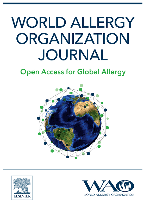
World Allergy Organization Journal
Fostering Collaboration in Allergy ScienceWorld Allergy Organization Journal is a premier open-access publication dedicated to advancing the understanding and treatment of allergic diseases and related conditions. Published by ELSEVIER, this journal boasts a commendable impact factor and ranks in the second quartile for both Immunology and Allergy, as well as the first quartile in Pulmonary and Respiratory Medicine. Since its inception as an open-access journal in 2008, it has consistently aimed to provide a credible platform for researchers, clinicians, and students to disseminate original research, reviews, and clinical studies. With its emphasis on high-quality scholarship and practical applications, the World Allergy Organization Journal plays a crucial role in bridging theoretical knowledge with clinical practice, making significant contributions to the fields of immunology, allergy, and respiratory medicine. The journal is particularly notable for its accessibility to a global audience, exemplified by its open-access model since 2008, promoting a wider exchange of ideas and innovations across borders.

Asia Pacific Allergy
Transforming Allergy Care Through Collaborative ResearchAsia Pacific Allergy, published by Lippincott Williams & Wilkins, is a prominent academic journal dedicated to advancing research and clinical practice in the fields of dermatology, immunology, and allergy. With its ISSN 2233-8276 and E-ISSN 2233-8268, the journal provides a platform for innovative studies and reviews that cater to an international audience of researchers, healthcare professionals, and students involved in allergy and related disorders. Although it does not currently offer open access to its publications, the journal's robust output from 2015 to 2017 and its ongoing contribution to the literature from 2021 to 2024 showcase the evolving landscape of allergy research in the Asia Pacific region. Recognized in the 2023 Journal Citation Reports, it holds a Q2 ranking in Dermatology and a Q3 ranking in Immunology and Allergy, while its Scopus ranks further emphasize its significance within these domains, positioning it among the top journals in the field. As a source of cutting-edge research, Asia Pacific Allergy plays a vital role in fostering collaboration and knowledge dissemination, ultimately assisting in the betterment of patient care and treatment strategies across the region.

Journal of Asthma and Allergy
Unlocking insights for better respiratory health.The Journal of Asthma and Allergy, published by DOVE MEDICAL PRESS LTD, is a leading open-access journal dedicated to advancing research in the fields of immunology, allergy, and pulmonary medicine. Since its inception in 2008, this journal has provided a vital platform for disseminating high-quality, peer-reviewed research that explores the complexities of asthma and allergy, allowing researchers, professionals, and students to access critical insights without subscription barriers. With an impressive impact factor reflected in its 2023 quartile rankings (Q2) in both Immunology and Allergy, as well as Pulmonary and Respiratory Medicine, the journal stands as a significant contributor to the scientific community, promoting innovative findings that support clinical practice and patient care. Based in New Zealand, the Journal of Asthma and Allergy continues to be at the forefront of research, from its dedication to publishing cutting-edge studies to fostering an inclusive academic discourse that spans the globe. Access to relevant articles is available online, ensuring that all stakeholders in these fields can stay informed and engaged.
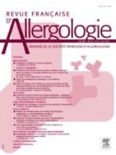
Revue Francaise d Allergologie
Advancing Allergy Research for Tomorrow's InnovationsThe Revue Francaise d'Allergologie, an esteemed publication in the field of Immunology and Allergy, is published by ELSEVIER MASSON, CORP OFF in France. This journal plays a pivotal role in disseminating significant findings and advancements in allergy research and immunotherapy, reflecting the latest trends and challenges in these rapidly evolving areas. As part of its commitment to scholarly rigor, the journal encompasses a wide range of topics pertinent to allergology, aiming to bridge the gap between clinical practice and academic research. Although currently not listed as open access, it provides critical insights essential for researchers, professionals, and students alike, ensuring the advancement of knowledge and therapeutic strategies in allergy and immunology. With its impact factor and positioning in the Q4 category, it serves as a valuable resource, aiding in the education and development of future leaders in the field. The Revue Francaise d'Allergologie continues to be a vital platform for the exchange of innovative ideas and findings from 2009 to the present.
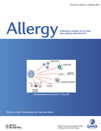
ALLERGY
Pioneering Research in Allergy and Immunological Health.ALLERGY is a leading international journal published by WILEY, dedicated to advancing the understanding of allergic diseases and immunology. With an ISSN of 0105-4538 and an E-ISSN of 1398-9995, this esteemed journal has been at the forefront of the field since its inception in 1948 and continues to publish high-quality research up until 2024. Positioned in the Q1 category for both Immunology and Allergy, ALLERGY ranks impressively within the top percentiles of its categories, underscoring its significant impact, as reflected in its Scopus rankings (#11 out of 233 in Immunology and Allergy, and #14 out of 236 in Immunology and Microbiology). Researchers and practitioners accessing this journal can expect a rigorous selection of peer-reviewed articles that address current challenges, innovative therapies, and advancements in the immunological sciences. Although it is not an open-access journal, ALLERGY remains vital for academics, healthcare professionals, and students alike, fostering a deeper understanding of the mechanisms and treatments associated with allergies.

International Forum of Allergy & Rhinology
Transforming Research into Practice in Allergy and RhinologyThe International Forum of Allergy & Rhinology, published by Wiley, is a leading journal dedicated to advancing the field of allergy, rhinology, and related health issues. With an ISSN of 2042-6976 and an E-ISSN of 2042-6984, this esteemed journal showcases high-quality research and innovative findings by publishing original articles, reviews, and clinical case studies. As of 2023, it holds impressive rankings within the Scopus metrics, placing it in the top 2% for Medicine in Otorhinolaryngology and in the top 16% for Immunology and Allergy, highlighting its influence and credibility in these specialized fields. Operating without an open access model, the journal aims to offer comprehensive insights into the diagnosis and treatment of allergic conditions and their impact on rhinology, fostering a deeper understanding among researchers and practitioners. Located in Hoboken, NJ, the journal has been at the forefront of scientific exploration since its inception in 2011, continuing to play a pivotal role in informing the academic community and influencing clinical practice up to 2024 and beyond.
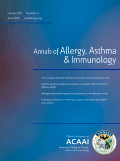
ANNALS OF ALLERGY ASTHMA & IMMUNOLOGY
Transforming the Landscape of Immunological ScienceANNALS OF ALLERGY ASTHMA & IMMUNOLOGY is a premier peer-reviewed journal published by Elsevier Science Inc, dedicated to advancing the fields of allergy, asthma, and immunology. With its roots dating back to 1995 and with a focus on high-impact research, this journal has established itself as a leading platform for the dissemination of original research, reviews, and clinical studies within these critical areas. The journal boasts an impressive impact factor, supporting its Q2 ranking in both Immunology and Allergy, as well as in Pulmonary and Respiratory Medicine, indicating its significant contribution to the scientific community. Although it does not currently offer open access options, its comprehensive coverage and rigorous peer-review process ensure that published articles are of the highest quality, making it an invaluable resource for researchers, clinicians, and students alike. The Scopus rankings reflect its esteemed position in the academic landscape, providing professionals with access to cutting-edge developments and insights into the management and treatment of allergic and respiratory conditions.

Egyptian Journal of Pediatric Allergy and Immunology
Fostering excellence in pediatric allergy and immunology research.Welcome to the Egyptian Journal of Pediatric Allergy and Immunology, a leading academic platform dedicated to the advancement of knowledge in the field of pediatric allergy and immunology. Published by the prestigious Egyptian Society of Pediatric Allergy & Immunology, this journal aims to address the pressing challenges and breakthroughs in the diagnosis, treatment, and management of allergic diseases in children. As a crucial resource for researchers, healthcare professionals, and students, it focuses on disseminating high-quality, peer-reviewed articles that contribute to the global understanding of allergic conditions and immunological responses in pediatric populations. Although the journal is currently not an Open Access publication, it provides a valuable gateway to research findings that can shape clinical practice and influence future investigations. With an emphasis on contributing to improved healthcare outcomes for children suffering from allergy and immunology disorders, the Egyptian Journal of Pediatric Allergy and Immunology stands out as an essential reference in the field.
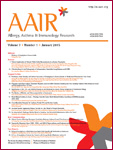
Allergy Asthma & Immunology Research
Elevating the discourse in immunology and respiratory medicine.Allergy Asthma & Immunology Research, published by the Korean Academy of Asthma Allergy & Clinical Immunology, is a leading journal dedicated to advancing the fields of immunology, allergy, and respiratory medicine. With an ISSN of 2092-7355 and an E-ISSN of 2092-7363, this esteemed publication has been a cornerstone for researchers and practitioners since its inception in 2009 and continues to disseminate critical findings through till 2024. The journal is ranked in the Q3 category in Immunology and the Q2 category in Immunology and Allergy as well as Pulmonary and Respiratory Medicine, illustrating its impact in these vital fields. With a solid Scopus ranking in multiple sub-disciplines, the journal not only contributes to the scientific discourse but also promotes innovative research and clinical practices. Although currently operating without an open access model, the journal remains highly regarded for its thorough peer-review process and commitment to academic excellence, making it an essential resource for professionals, researchers, and students passionate about advancing knowledge in allergy, asthma, and immunology.

AIMS Allergy and Immunology
Unveiling Innovations in Allergy and ImmunologyAIMS Allergy and Immunology is a prestigious open access journal dedicated to advancing knowledge in the fields of allergy and immunology. Published by the American Institute of Mathematical Sciences (AIMS), this journal provides a vibrant platform for researchers, practitioners, and scholars to share groundbreaking findings and insights. Recognized for its commitment to disseminating high-quality research since its inception in 2017, AIMS Allergy and Immunology contributes significantly to the understanding of complex immunological mechanisms and allergic responses, thus playing a pivotal role in enhancing clinical practices and therapeutic strategies. With its ISSN 2575-615X, the journal aims to facilitate a robust exchange of ideas and promote collaboration within the scientific community. Researchers and practitioners are encouraged to access the latest studies and reviews, which are all freely available online, ensuring that vital information reaches a global audience without barriers. Together, we can tackle the challenges posed by allergies and immune disorders through rigorous scientific inquiry and innovation.